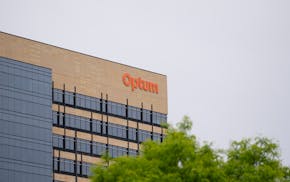Apogee Enterprises, a leader in the architectural glass industry, celebrated its 75th anniversary this year as a much leaner and focused company.
The Bloomington-based company, which has a key manufacturing site in Owatonna, employed 7,200 in 2020 after a decade of acquisitions. Today, it's closer to 4,500 workers after Apogee closed some facilities in other states and exited business lines whose profit margins lagged the rest of the organization.
The restructuring began almost immediately after Ty Silberhorn, a former 3M executive, became president and CEO in January 2021.
Nearly every aspect of the company was touched, he said, from the IT systems to the way manufacturing operations work.
"It helps [that] there was a clear need to make some changes just from a business performance perspective, " Silberhorn said. "It's a little bit easier to hit the ground running and get the organization aligned that we need to make some big changes here to put ourselves on solid footing."
Apogee's annual revenue had peaked at $1.4 billion for the year ended Feb. 28, 2019. In the next two years, sales declined 12% and earnings in 2022 had declined to the lowest point in 10 years and earnings were down by two-thirds. That helped set the stage for transformational change.
Apogee's roots are in the Minneapolis Harmon Auto Glass business, which opened in 1949. In 2004, that business was sold as the company grew to focus on architectural glass and framing systems, architectural services for glass-heavy commercial and office buildings and glass for fine-art and custom-framing markets.
Apogee's glass can be seen in such Twin Cities landmarks as U.S. Bank Stadium, the Minneapolis Central Library and the Capella Tower.
Silberhorn took over a company that had evolved basically into a holding company with fairly independent units, with different brands and different IT systems such as human resource and payroll.
Former CEO Joe Puishys had started to move Apogee into more of an enterprise model, starting to connect the systems and businesses. Silberhorn accelerated that process.
With the help of business consultants and plenty of discussion with employees and customers, Apogee developed a three-point plan focused on economic leadership, portfolio management and strengthening the core of the business. That meant selling some assets, such as an architectural glass facility in Statesboro, Ga.
While that was going on, the company also had to address some of the duplications in HR, IT and finance systems and adopt common business practices.
All of this resulted in an intentional change of culture.
Apogee was familiar with lean management and continuous improvement models. But Silberhorn says he has seen similar programs launch effectively during his career only to lose luster — especially programs that utilized a top-down implementation.
Silberhorn and his team launched the Apogee Management System, a continuous improvement plan, from the production facilities — starting at the Viracon plant in Owatonna — not from the top.
"That was a really big difference," Silberhorn said.
The first goal: becoming more efficient and introducing best practices on the floor each hour, each shift and each day.
"Instead of looking at big huge programs that might take months, we really focused on, "Let's help that production line get better this hour, lets help that production line get better before the next shift comes on," Silberhorn said.
Apogee then spread that model around to the rest of the organization over the past few years.
"Each of those businesses really felt different and kind of standalone," Silberhorn said. "We've created a lot more connectivity across the enterprise."
The program is effective because it has buy-in, said Doug Betti, director of operations at the Owatonna plant who has worked at Apogee for 24 years.
"This is by far the most effective continuous improvement program," Betti said. "There is a lot more floor involvement."
More shop employees participate more often in ways to find efficiency, he said. The Viracon factory produces custom glass panels for office and industrial buildings. Raw sheets of glass are cut to size and a variety of coatings are put on before panes are paired together and finished. It's a process where glass gets broken every day.
Through continuous improvement, the plant has improved from 24% of the raw glass tossed to recycling to 14% of the glass. Adding more automation to the process also has reduced waste and the amount of physical strain on employees, while improving safety and efficiency.
For example, a new automated loading wall installed recently between sorting racks and the insulating glass section is reducing the amount of physical handling.
"We continue to ratchet down the maximum lifting done through automation," Betti said.
Beth Lilly, chief investment officer of the Pohlad Cos., has been a board member of Apogee Enterprises since 2020. Before that, she followed the company for years as an investment analyst.
She has observed the cultural transformation at Apogee firsthand and gives the credit to Silberhorn and his management team for improving the company's margins and its return on invested capital.
"He's got the entire organization reading from the same playbook," Lilly said.
Aside from adopting similar back office operations and processes, there started to be more flow between the sectors and business units. Adopting an enterprise model also created more opportunities for employees' career paths.
Five to 10 years ago, it was rare for employees to move between sectors, Silberhorn said. Now they are seeing more promotions and people moving across businesses after investing more in leadership development programs.
Apogee's profit margins are improving, too. For the past two fiscal years, revenue was back over $1.4 billion. Over the last three years, Apogee's net income has grown 574%, the second-fastest among Minnesota based public companies.
The AIA/Deltek Architecture Billings Index, a leading indicator for nonresidential building construction, has shown the industry in contraction for more than a year.
But Silberhorn said, with the company's stronger operational footing — and long-term debt at the lowest level in years — Apogee is still looking toward growth. Officials expect the company to outpace the market.
With the company's stock also trading near all-time highs, the company is looking toward new growth opportunities.
"Acquisitions will be part of our growth strategy, without question," Silberhorn said. "We're being very strategic in what we're looking at. And we're being very thoughtful about both strategic fit and being financially accretive to our long term business goals."

UnitedHealth sues the Guardian, alleging defamation in coverage of nursing home care

Prices for international flights drop as major airlines navigate choppy economic climate
Minnesota's med spa industry rises in popularity — and with little regulation

Hundreds line up at Best Buy to nab Nintendo Switch 2, in scene like '90s opening parties

